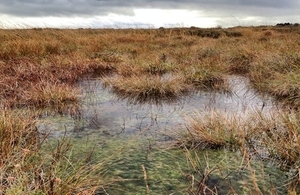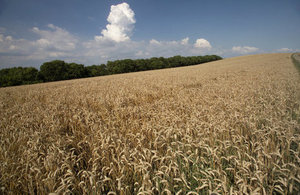Cumbria receives a new National Nature Reserve
Bolton Fell and Walton Mosses is declared a new National Nature Reserve by Natural England.
Published 9 July 2019 From: Department for Environment, Food & Rural Affairs and Natural England

Natural England has today announced the declaration of a new National Nature Reserve in Cumbria – Bolton Fell and Walton Mosses National Nature Reserve, home to one of Western Europe’s rarest and most threatened habitats, the lowland raised bog.
Located near Carlisle, the new reserve encompasses the recently restored Bolton Fell Moss Site of Special Scientific Interest (SSSI) and the pristine condition Walton Fell Moss SSSI.
The restoration of Bolton Fell by Natural England follows 50 years of extensive damage from the removal of peat and peat-forming vegetation for horticulture, which created unsuitable conditions for specialist bog plants and wildlife such as curlews and redshanks to thrive.
Now restored, Bolton Fell Moss is recovering and is on track to develop important peat forming vegetation which can be already found at Walton Moss. In time, the site will become an active carbon sink, capturing and storing carbon to reduce the amount of greenhouse gases emitted into the earth’s atmosphere.
To mark the occasion, Chair of Natural England Tony Juniper has today officially declared the National Nature Reserve.
Speaking at Bolton Fell, Tony Juniper, Chair of Natural England says:
Since the ice age, our active lowland raised bogs have been storing large amounts of carbon and now play a vital role in combatting the impacts of climate change.
I am therefore delighted to officially declare Bolton Fell and Walton Moss a National Nature Reserve, set to serve the local community and wildlife for future generations to come.
Cumbria, home to almost half England’s lowland raised bogs, has seen over 500 hectares of lowland raised bogs restored under Natural England’s Cumbrian BogLIFE+ Project and funding from the Department for Environment, Food and Rural Affairs.
In the UK, 95% of lowland raised bogs are classified as threatened habitat due to centuries of drainage, peat-cutting, tree planting and agricultural practises. Six years of extensive restoration of Bolton Fell Moss has led to the establishment of important bog forming plants, with sphagnum mosses, sundew, cranberry, bog rosemary and cotton grass in full bloom.
Bolton Fell Moss is also seeing the return of a number of rare British plants and animals such as curlews, redshank and snipe, in addition to black darters, raft spiders, adders, lizards and the nationally significant large heath.
Later this summer the local community will soon be able to explore the full extent of Bolton Fell and Walton Mosses wildlife and specialist habitats, and enjoy the vast extent of the lowland raised bog. Visitors will also be able to learn more about nature conservation through research and outdoor learning. At present, visitors have full access to Walton Moss, and arrangements can be made to visit Bolton Fell Moss.
Natural England’s Senior Reserve Manager, Deborah Land says:
The restoration of Bolton Fell Moss has been vital to safeguarding this important and rare habitat and it is brilliant that we can celebrate its recovery though the declaration of Bolton Fell and Walton Mosses as a National Nature Reserve.
Following the completion of the restoration of the Moss, the new National Nature Reserve will now provide valuable outdoor space for the local community to enjoy and engage with and to support outdoor learning and research.
The restoration of the lowland bog and declaration of the site as a National Nature Reserve contributes to the delivery of the government’s 25 Year Environment Plan and Natural England’s Conservation Strategy for the 21st Century, ‘Conservation 21’. Peatland restoration will be at the heart of the government’s England Peat Strategy, set to launch later this year. This strategy will set out how Natural England will support the restoration and sustainable management of England’s peatlands. The England Peat Strategy will help set the UK on a course towards the new target for net zero greenhouse gas emissions by 2050 and contribute to mitigating climate change.

